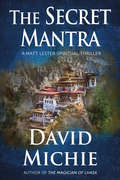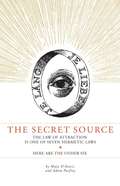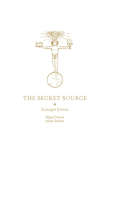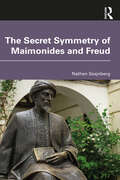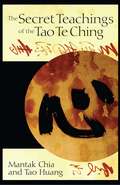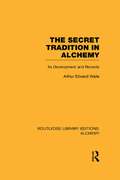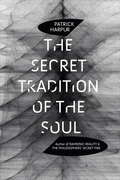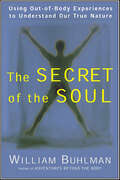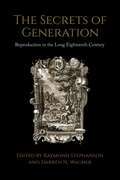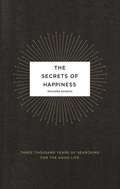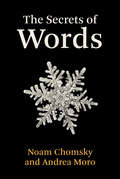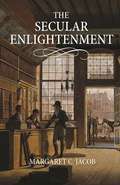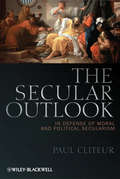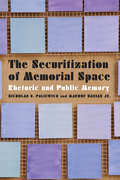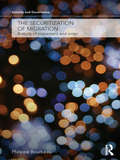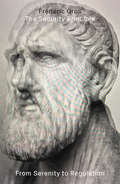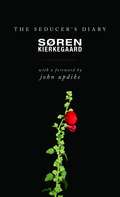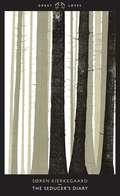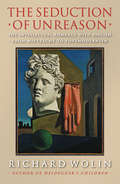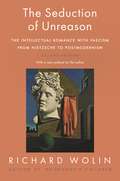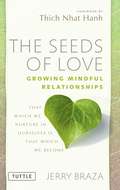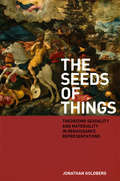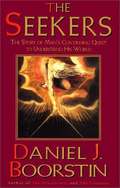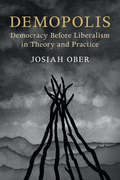- Table View
- List View
The Secret Mantra: A Matt Lester Spiritual Thriller
by David MicheIn a remote, Himalayan monastery, Matt Lester has devoted five years of spiritual preparation for this moment: it is his destiny to open an ancient, sealed scroll containing prophetic wisdom the world urgently needs. But when his time comes, violent assailants steal the scroll. Matt is caught up in a dangerous, high-stakes hunt to recover it, turning him from the pursuer to the pursued.On the other side of the world, the results of scientist Alice Weisenstein&’s mind-body healing research are about to be revealed. Things take a sinister turn when her supervisor goes missing - and she realizes she is being followed. Guided by the lamas, Matt&’s search for the scroll takes him to Alice. The pair become caught between powerful influences and escalating threats. Together they must decide who they can really trust.The Secret Mantra weaves breakthrough science and spiritual insights into a heart-stopping storyline. It won&’t just have you turning the pages. It will shake up your whole idea of who you are, and the transformation of which you are capable.
The Secret Source: Here Are the Other Six
by Adam Parfrey Maja D'Aoust Jodi WilleThe Secret Source reveals the actual occult doctrines that gave birth to "The Law of Attraction" and inspired the media phenomenon known as The Secret. Why did The Secret divulge only one of the seven Hermetic Laws? What are the others, what do they say, and how could they enrich your life? The Secret Source provides the actual texts and fascinating stories behind the "Emerald Tablet," the Kabbalistic treatise known as "The Kybalion," and Manly P. Hall's essay on the occult movement that produced it.
The Secret Source: The Law of Attraction and its Hermetic Influence Throughout the Ages
by Adam Parfrey Maja D'AoustThe Secret Source reveals the actual occult doctrines that gave birth to "The Law of Attraction" and later inspired the media phenomenon known as The Secret. Follow the trail into ancient Egypt to uncover where the law of attraction was first recorded, and how it was brought back to America to foment the New Thought movement and the prosperity cults of modern times. The new, enlarged edition will have a new section on Sex Magic and its relationship with the law of attraction. Maja D'Aoust conducts popular lectures on esoterica. Adam Parfrey is releasing this fall a visual history of fraternal orders, Ritual America.
The Secret Symmetry of Maimonides and Freud
by Nathan SzajnbergThe Secret Symmetry of Maimonides and Freud presents the parallels between The Guide of the Perplexed and The Interpretation of Dreams, considering how Maimonides might be perceived as anticipating Freud’s much later work. The Secret Symmetry of Maimonides and Freud suggests that humankind has secrets to hide and does so by using common mechanisms and embedding revealing hints for the benefit of the true reader. Using a psychoanalytic approach in tandem with literary criticism and an in-depth assessment of Judaica, Szajnberg demonstrates the similarities between these two towering Jewish intellectual pillars. Using concepts of esoteric literature from the Torah and later texts, this book analyses their ideas on concealing and revealing to gain a renewed perspective on Freud’s view of dreams. Throughout, Szajnberg articulates the challenges of reading translated works and how we can address the pitfalls in such translations. The book is a vital read for psychoanalysts in training and practice, as well as those interested in Judaica, the history of ideas, and early medieval studies.
The Secret Teachings of the Tao Te Ching
by Mantak Chia Tao HuangReveals techniques for achieving spiritual immortality through an in-depth exploration of Lao-tzu's Tao Te Ching • Includes practices and meditations for living in harmony with the Tao (universal essence) and Te (kind action) • Reveals the integration of heavenly and human power in the mystic field within us • Presents Tao Huang's English translation of the Tao Te Ching from the original Chinese Mawangdui text unearthed in 1973 For over 2,500 years the words of the Tao Te Ching, the primary scripture of Laoism and Taoism, have been regarded as among the greatest treasures of the world. Lao-tzu, whose name means “the ancient child,” wrote these brief but essential verses that have both confounded and conferred blessings on humankind. Now Taoist masters Mantak Chia and Tao Huang guide readers through the origins of this philosophy, the meaning behind its 5,000 pictographs, and the way of living that generations have followed. While the text of the Tao Te Ching has been passed down in literary form for generations, the essence of the text can be understood only through heart awakening--a true integration of body and mind--made possible with the insights and exercises in this book. The authors analyze Lao-tzu's teachings, line by line, and offer meditations, interpretations, and practical illustrations that clarify the true meaning and purpose of this classic text.
The Secret Tradition in Alchemy: Its Development and Records (Routledge Library Editions: Alchemy)
by Arthur Edward WaiteA complete history of alchemy revealing the subject as much more than the attempts in early science of turning base metals into gold or silver, this book goes about intimating the mystical experience underlying hermetic symbolism. It outlines some of the ‘secret’ inner meanings to alchemy - symbolism, metaphysics, and spirituality. This book contains a universe of information and is worthwhile reading for anyone wanting to know more on this engaging subject. Originally published in 1926.
The Secret Tradition of the Soul
by Patrick HarpurIn The Secret Tradition of the Soul, author Patrick Harpur argues that answers to life's most difficult questions--the meaning of life, the nature of self, and the existence of an afterlife--can be met by a visionary tradition that runs through Western culture, from Greek philosophy and Renaissance alchemy to Romantic poetry and modern depth psychology. This hidden tradition, according to Harpur, places our soul at the center of the universe and emphasizes imagination, the collective unconscious, and an "otherworld" or afterlife; above all, it teaches us how to know ourselves and how to recover a sense of meaning largely lost today. Harpur shows how this tradition drives the literature of otherworld journeys, from the flights of shamans and the dreams of psychoanalysis to the mystic imagination of Romantic poets and the visions of those having near-death experiences. The Secret Tradition of the Soul is the first book to gather together all the threads of the soul tradition and weave them into a bigger, clearer picture, presenting a worldview at once ancient and revolutionary.About the Imprint: EVOLVER EDITIONS promotes a new counterculture that recognizes humanity's visionary potential and takes tangible, pragmatic steps to realize it. EVOLVER EDITIONS explores the dynamics of personal, collective, and global change from a wide range of perspectives. EVOLVER EDITIONS is an imprint of North Atlantic Books and is produced in collaboration with Evolver, LLC.From the Trade Paperback edition.
The Secret of the Soul: Using Out-of-Body Experiences to Understand Our True Nature
by William BuhlmanIn this remarkable book, William Buhlman, author of the bestselling Adventures Beyond the Body, offers the reader a comprehensive guidebook to understanding and exploring the fascinating phenomenon of out-of-body experiences (OBEs). Learn how you can:Explore your true spiritual self and attain profound transformation in your awareness and knowledge of the universe.Gain life-changing benefits as you break free from mental and physical limitationsContact departed loved ones using OBEs to move beyond the current limited understanding of death.Filled with engrossing stories based on the testimonies of people from all over the world, and offering forty new, easy-to-understand techniques, The Secret of the Soul will prepare human beings everywhere for the next major leap in the evolution of consciousness.
The Secrets of Generation
by Darren Wagner Raymond StephansonFrom theories of conception and concepts of species to museum displays of male genitalia and the politics of breastmilk, The Secrets of Generation is an interdisciplinary examination of the many aspects of reproduction in the eighteenth century.Exploring the theme of generation from the perspective of histories of medicine, literature, biology, technology, and culture, this collection offers a range of cutting-edge approaches. Its twenty-four contributors, scholars from across Europe and North America, bring an international perspective to discuss reproduction in British, French, American, German, and Italian contexts.The definitive collection on eighteenth-century generation and its many milieus, The Secrets of Generation will be an essential resource for studying this topic for years to come.
The Secrets of Happiness: Three Thousand Years of Searching for the Good Life
by Richard SchochUnhappy is the story of happiness. More than two thousand years ago, when the ancient Greeks first pondered what constitutes "the good life," happiness was considered a civic virtue that demanded a lifetime's cultivation. Not just mere enjoyment of pleasure and mere avoidance of suffering, true happiness was an achievement, not a birthright. Now, in an age of instant gratification and infinite distraction, history professor Richard Schoch takes a refreshingly contemplative look at a question that's as vital today as ever: What does it mean to be happy? Schoch consults some of history's greatest thinkers -- from Aristotle to Thomas Aquinas to Buddha -- in his quest to understand happiness in all its hard-won forms. Packed with three thousand years' worth of insights, many long forgotten, The Secrets of Happiness is a breath of ancient wisdom for anyone who yearns for the good life.
The Secrets of Words
by Noam Chomsky Andrea MoroTwo distinguished linguists on language, the history of science, misplaced euphoria, surprising facts, and potentially permanent mysteries.In The Secrets of Words, influential linguist Noam Chomsky and his longtime colleague Andrea Moro have a wide-ranging conversation, touching on such topics as language and linguistics, the history of science, and the relation between language and the brain. Moro draws Chomsky out on today&’s misplaced euphoria about artificial intelligence (Chomsky sees &“lots of hype and propaganda&” coming from Silicon Valley), the study of the brain (Chomsky points out that findings from brain studies in the 1950s never made it into that era&’s psychology), and language acquisition by children. Chomsky in turn invites Moro to describe his own experiments, which proved that there exist impossible languages for the brain, languages that show surprising properties and reveal unexpected secrets of the human mind. Chomsky once said, &“It is important to learn to be surprised by simple facts&”—&“an expression of yours that has represented a fundamental turning point in my own personal life,&” says Moro—and this is something of a theme in their conversation. Another theme is that not everything can be known; there may be permanent mysteries, about language and other matters. Not all words will give up their secrets.
The Secular Enlightenment
by Margaret C. JacobA major new history of how the Enlightenment transformed people’s everyday livesThe Secular Enlightenment is a panoramic account of the radical ways that life began to change for ordinary people in the age of Locke, Voltaire, and Rousseau. In this landmark book, familiar Enlightenment figures share places with voices that have remained largely unheard until now, from freethinkers and freemasons to French materialists, anticlerical Catholics, pantheists, pornographers, readers, and travelers.Margaret Jacob, one of our most esteemed historians of the Enlightenment, reveals how this newly secular outlook was not a wholesale rejection of Christianity but rather a new mental space in which to encounter the world on its own terms. She takes readers from London and Amsterdam to Berlin, Vienna, Turin, and Naples, drawing on rare archival materials to show how ideas central to the emergence of secular democracy touched all facets of daily life. Human frailties once attributed to sin were now viewed through the lens of the newly conceived social sciences. People entered churches not to pray but to admire the architecture, and spent their Sunday mornings reading a newspaper or even a risqué book. The secular-minded pursued their own temporal and commercial well-being without concern for the life hereafter, regarding their successes as the rewards for their actions, their failures as the result of blind economic forces.A majestic work of intellectual and cultural history, The Secular Enlightenment demonstrates how secular values and pursuits took hold of eighteenth-century Europe, spilled into the American colonies, and left their lasting imprint on the Western world for generations to come.
The Secular Outlook: In Defense of Moral and Political Secularism (Blackwell Public Philosophy Series #21)
by Paul CliteurThe Secular Outlook: In Defense of Moral and Political Secularism shows how people can live together and overcome the challenge of religious terrorism by adopting a "secular outlook" on life and politics. Shows how secularism can answer the problem of religious terrorism Provides new perspectives on how religious minorities can be integrated into liberal democracies Reveals how secularism has gained a new political and moral significance. Also examines such topics as atheism, religious criticism and free speech
The Securitization of Memorial Space: Rhetoric and Public Memory
by Nicholas S. Paliewicz Marouf Hasian Jr.The Securitization of Memorial Space argues that the National September 11 Memorial and Memorial Museum is a securitized site of memory—what Foucault called a dispositif—that polices visitors and publics to remember trauma, darkness, and victimage in ways that perpetuate the “necessity” of the Global War on Terrorism. Contributing to studies in public memory, rhetoric and argumentation, and critical security studies, Nicholas S. Paliewicz and Marouf Hasian Jr. show how various human and nonhuman actors participated in complicated argumentative formations that have mobilized political, performative, and militaristic practices of anti-terroristic violence in other parts of the world. While there were times that certain argumentative stakeholders—such as local New Yorkers—questioned the necessity of securitizing this site of memory, agentic factions including the families of those who died on 9/11, public supporters, security agents, and politicians created an ideologically oriented security assemblage that remembers 9/11 through counter-terroristic performances at Ground Zero. In chronological order from the 2001 “dustbowl” to the present popularization of 9/11 memories, the authors present seven chapters of rich rhetorical analysis that show how the National September 11 Memorial and Memorial Museum perpetuates grief, uncertainty, and angst that affects public memory in multidirectional ways.
The Securitization of Migration: A Study of Movement and Order (Security and Governance)
by Philippe BourbeauThe international movement of people is provoking worldwide anxiety and apprehension. Nation-states around the globe, especially Western ones, are cracking down on migration for security reasons. International migration has become a key security issue and is perceived, by some, as an existential security threat. The Securitization of Migration is about the movement of people and the system of order underpinning the movement. In undertaking a comparative study of Canada and France, the study analyzes the process of securitizing migration. It explores the process of discursively and institutionally integrating international migration into security frameworks that emphasize policing and defence. Drawing upon social theory, migration studies, and Securitization Theory, Philippe Bourbeau seeks to understand the concepts of power underlying security frameworks and how these affect the treatment of migrants and immigrants. This book is one of the first to systematically and comparatively examine the role of political agents, media agents, and contextual factors in the process of securitizing migration. The book will be of interest to students and scholars concerned with comparative and theoretical approaches to security and migration studies.
The Security Principle: From Serenity to Regulation
by Frederic GrosThe genealogy of the idea of security from ancient Greece to the war on terrorismIn The Security Principle, French philosopher Frédéric Gros takes a historical approach to the concept of "security", looking at its evolution from the Stoics to the social network. With lucidity and rigour, Gros's approach is fourfold, looking at security as a mental state, as developed by the Greeks; as an objective situation and absence of all danger, as prevailed in the Middle Ages; as guaranteed by the nation state and its trio of judiciary, police and military; and finally "biosecurity", control, regulation and protection in the flux of contemporary society. In this deeply thought-provoking account, Gros's exploration of security shines a light both on its past meanings as well as its present uses, exposing the contemporary abuses of security and the pervasiveness of it in everyday life in the Global North.
The Seducer's Diary
by Søren Kierkegaard"In the vast literature of love, The Seducer's Diary is an intricate curiosity--a feverishly intellectual attempt to reconstruct an erotic failure as a pedagogic success, a wound masked as a boast," observes John Updike in his foreword to Søren Kierkegaard's narrative. This work, a chapter from Kierkegaard's first major volume, Either/Or, springs from his relationship with his fiancée, Regine Olsen. Kierkegaard fell in love with the young woman, ten years his junior, proposed to her, but then broke off their engagement a year later. This event affected Kierkegaard profoundly. Olsen became a muse for him, and a flood of volumes resulted. His attempt to set right, in writing, what he feels was a mistake in his relationship with Olsen taught him the secret of "indirect communication." The Seducer's Diary, then, becomes Kierkegaard's attempt to portray himself as a scoundrel and thus make their break easier for her. Matters of marriage, the ethical versus the aesthetic, dread, and, increasingly, the severities of Christianity are pondered by Kierkegaard in this intense work.
The Seducer's Diary (Penguin Great Loves)
by Soren KierkegaardJohannes is an aesthete, dedicated to creating the possibility of seduction through the careful manipulation of young women. He stealthily pursues the innocent Cordelia until she becomes increasingly drawn to him. But when she is ready to give herself completely, she realizes she may have got everything wrong. United by the theme of love, the writings in the Great Loves series span over two thousand years and vastly different worlds. Readers will be introduced to love’s endlessly fascinating possibilities and extremities: romantic love, platonic love, erotic love, gay love, virginal love, adulterous love, parental love, filial love, nostalgic love, unrequited love, illicit love, not to mention lost love, twisted and obsessional love….
The Seduction of Unreason: The Intellectual Romance with Fascism from Nietzsche to Postmodernism
by Richard WolinFifteen years ago, revelations about the political misdeeds of Martin Heidegger and Paul de Man sent shock waves throughout European and North American intellectual circles. Ever since, postmodernism has been haunted by the specter of a compromised past. In this intellectual genealogy of the postmodern spirit, Richard Wolin shows that postmodernism's infatuation with fascism has been widespread and not incidental. He calls into question postmodernism's claim to have inherited the mantle of the left--and suggests that postmodern thought has long been smitten with the opposite end of the political spectrum.In probing chapters on C. G. Jung, Hans-Georg Gadamer, Georges Bataille, and Maurice Blanchot, Wolin discovers an unsettling commonality: during the 1930s, these thinkers leaned to the right and were tainted by a proverbial "fascination with fascism." Frustrated by democracy's shortcomings, they were seduced by fascism's grandiose promises of political regeneration. The dictatorships in Italy and Germany promised redemption from the uncertainties of political liberalism. But, from the beginning, there could be no doubting their brutal methods of racism, violence, and imperial conquest.Postmodernism's origins among the profascist literati of the 1930s reveal a dark political patrimony. The unspoken affinities between Counter-Enlightenment and postmodernism constitute the guiding thread of Wolin's suggestive narrative. In their mutual hostility toward reason and democracy, postmodernists and the advocates of Counter-Enlightenment betray a telltale strategic alliance--they cohabit the fraught terrain where far left and far right intersect.Those who take Wolin's conclusions to heart will never view the history of modern thought in quite the same way.
The Seduction of Unreason: The Intellectual Romance with Fascism from Nietzsche to Postmodernism, Second Edition
by Richard WolinEver since the shocking revelations of the fascist ties of Martin Heidegger and Paul de Man, postmodernism has been haunted by the specter of a compromised past. In this intellectual genealogy of the postmodern spirit, Richard Wolin shows that postmodernism’s infatuation with fascism has been extensive and widespread. He questions postmodernism’s claim to have inherited the mantle of the Left, suggesting instead that it has long been enamored with the opposite end of the political spectrum. Wolin reveals how, during in the 1930s, C. G. Jung, Hans-Georg Gadamer, Georges Bataille, and Maurice Blanchot were seduced by fascism's promise of political regeneration and how this misapprehension affected the intellectual core of their work. The result is a compelling and unsettling reinterpretation of the history of modern thought. In a new preface, Wolin revisits this illiberal intellectual lineage in light of the contemporary resurgence of political authoritarianism.
The Seeds of Love
by Thich Nhat Hanh Jerry BrazaUsing the garden as metaphor, The Seeds of Love offers a process for creating mindfulness. Through the development of the practice of mindfulness, and using its tools to maintain a state of awareness and openness to self and others. Readers will learn how to nurture such seeds as compassion, joy and generosity and to use personal challenges such as jealousy, anger and self doubt as a means of growth. Using precepts from many faiths and traditions, The Seeds of Love fosters the practice of using simple, basic actions to reach the best within ourselves and share it with those around us. It will be an invaluable guide to anyone seeking deeper and more conscious relationships.
The Seeds of Things: Theorizing Sexuality and Materiality in Renaissance Representations
by Jonathan GoldbergThe title of this book translates one of the many ways in which Lucretius names the basic matter from which the world is made in De rerum natura. In Lucretius, and in the strain of thought followed in this study, matter is always in motion, always differing from itself and yet always also made of the same stuff. From the pious Lucy Hutchinson’s all but complete translation of the Roman epic poem to Margaret Cavendish’s repudiation of atomism (but not of its fundamental problematic of sameness and difference), a central concern of this book ishow a thoroughgoing materialism can be read alongside other strains in the thought of the early modern period, particularly Christianity.A chapter moves from Milton’s monism to his angels and their insistent corporeality. Milton’s angels have sex, and, throughout, this study emphasizes the consequences for thinking about sexuality offered by Lucretian materialism. Sameness of matter is not simply a question of same-sex sex, and the relations of atoms in Cavendish and Hutchinson are replicated in the terms in which they imagine marriages of partners who are also their doubles. Likewise, Spenser’s knights in the 1590 Faerie Queene pursue the virtues of Holiness, Temperance, and Chastity in quests that take the reader on a path of askesis of the kind that Lucretiusrecommends and that Foucault studied in the final volumes of his history of sexuality.Although English literature is the book’s main concern, it first contemplates relations between Lucretian matter and Pauline flesh by way of Tintoretto’s painting The Conversion of St. Paul. Theoretical issues raised in the work of Agamben and Badiou, among others, lead to a chapter that takes up the role that Lucretius has played in theory, from Bergson and Marx to Foucault and Deleuze.This study should be of concern to students of religion, philosophy, gender, and sexuality, especially as they impinge on questions of representation.
The Seekers: Man's Quest to Understand
by Daniel J. BoorstinThroughout history, from the time of Socrates to our own modern age, the human race has sought the answers to fundamental questions of life: Who are we? Why are we here?In his previous national bestsellers, The Discoverers and The Creators , Daniel J. Boorstin first told brilliantly how e discovered the reality of our world, and then he celebrated man's achievements in the arts. He now turns to the great figures in history who sought meaning and purpose in our existence. Boorstin says our Western culture has seen three grand epics of Seeking. First there was the heroic way of prophets and philosophers--men like Moses or Job or Socrates, Plato, and Aristotle, as well as those in the communities of the early church universities and the Protestant Reformation--seeking salvation or truth from the god above or the reason within each of us.Then came an age of communal seeking, with people like Thucydides and Thomas More and Machiavelli and Voltaire pursuing civilization and the liberal spirit. Finally, there was an age of the social sciences, when man seemed ruled by the forces of history. Here are the absorbing stories of exceptional men such as Marx, Spengler, and Toynbee, Carlyle and Emerson, and Malraux, Bergson, and Einstein.These great thinkers still have the power to speak to us, not always so much for their answers as for their way of asking the questions that never cease either to intrigue or to obsess us. In this impressive climax to a monumental trilogy, Daniel J. Boorstin once again shows that his ability to present challenging ideas, coupled with sharp portraits of great writers and thinkers, remains unparalleled.
The Seeley Lectures: Democracy before Liberalism in Theory and Practice (The Seeley Lectures)
by Josiah OberWhat did democracy mean before liberalism? What are the consequences for our lives today? Combining history with political theory, this book restores the core meaning of democracy as collective and limited self-government by citizens. That, rather than majority tyranny, is what democracy meant in ancient Athens, before liberalism. Participatory self-government is the basis of political practice in 'Demopolis', a hypothetical modern state powerfully imagined by award-winning historian and political scientist Josiah Ober. Demopolis' residents aim to establish a secure, prosperous, and non-tyrannical community, where citizens govern as a collective, both directly and through representatives, and willingly assume the costs of self-government because doing so benefits them, both as a group and individually. Basic democracy, as exemplified in real Athens and imagined Demopolis, can provide a stable foundation for a liberal state. It also offers a possible way forward for religious societies seeking a realistic alternative to autocracy.
